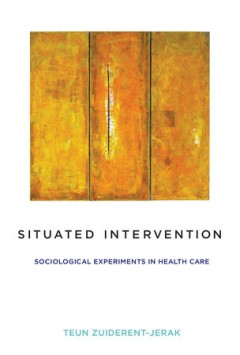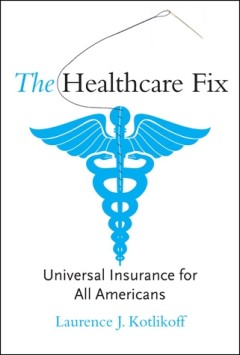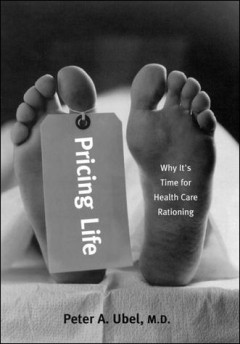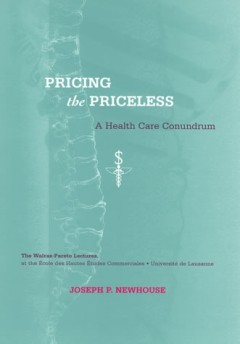Filter by

Chaos and Organization in Health Care
Two leading physicians' prescription for solving our health care problems: organizing the fragmented system that delivers care.One of the most daunting challenges facing the new U.S. administration is health care reform. The size of the system, the number of stakeholders, and ever-rising costs make the problem seem almost intractable. But in Chaos and Organization in Health Care, two leading ph…
- Edition
- -
- ISBN/ISSN
- 9780262259033
- Collation
- 1 online resource (xv, 278 pages) :illustrations
- Series Title
- -
- Call Number
- -

Situated Intervention: Sociological Experiments in Health Care
This work considers the question of how the direct involvement of social scientists in the practices they study can lead to the production of interesting sociological knowledge. It draws together two activities that are often seen as belonging to different realms: intervening in practices and furthering sociological understanding of them.OCLC-licensed vendor bibliographic record.
- Edition
- -
- ISBN/ISSN
- 9780262329439
- Collation
- 1 online resource (xi, 232 pages).
- Series Title
- -
- Call Number
- -

The Healthcare Fix: Universal Insurance for All Americans
A simple, straightforward, and foolproof proposal for universal health insurance from a noted economist.The shocking statistic is that forty-seven million Americans have no health insurance. When uninsured Americans go to the emergency room for treatment, however, they do receive care, and a bill. Many hospitals now require uninsured patients to put their treatment on a credit card which can sa…
- Edition
- -
- ISBN/ISSN
- 9780262277549
- Collation
- 1 online resource (116 pages)
- Series Title
- -
- Call Number
- -

Frontiers in Health Policy Research, Volume 1
This volume contains papers presented at "Frontiers in Health Policy Research", a conference held in Washington, D.C., on June 5, 1997"--Page xi.OCLC-licensed vendor bibliographic record.
- Edition
- -
- ISBN/ISSN
- 9780262273503
- Collation
- 1 online resource (xvii, 180 pages) :illustrations
- Series Title
- -
- Call Number
- -

Pricing life :why it's time for health care rationing
A rational look at health care rationing, from ethical, economic, psychological, and clinical perspectives. Although managed health care is a hot topic, too few discussions focus on health care rationing—who lives and who dies, death versus dollars. In this book physician and bioethicist Peter A. Ubel argues that physicians, health insurance companies, managed care organizations, and gover…
- Edition
- -
- ISBN/ISSN
- 9780262285346
- Collation
- 1 online resource (xix, 208 pages).
- Series Title
- -
- Call Number
- -

Pricing the priceless :a health care conundrum
The health care industry differs from most other industries in that medical pricing is primarily administered by the government and private insurers and in that it uses several types of contracts. Providers may receive a fixed sum for all necessary services within a given period of time, for the necessary services to treat a given condition, or for each specific service. The industry is changin…
- Edition
- -
- ISBN/ISSN
- 9780262280600
- Collation
- 1 online resource (viii, 258 pages) :illustrations.
- Series Title
- -
- Call Number
- -

Crowded out :the true costs of crowdfunding healthcare
"Crowded Out examines how charitable crowdfunding so quickly overtook public life, where it is taking us, and who gets left behind by this new platformed economy. While crowdfunding has become ubiquitous in our lives, it is largely misunderstood by the public: rather than a friendly free market "powered by the kindness" of strangers, crowdfunding is powerfully reinforcing inequalities and chang…
- Edition
- -
- ISBN/ISSN
- 9780262378611
- Collation
- 1 online resource
- Series Title
- -
- Call Number
- -

Rebel health :a field guide to the patient-led revolution in medical care
"Rebel Health is a field guide to how the underground, patient-led revolution can result in better health and help to heal health care"--OCLC-licensed vendor bibliographic record.
- Edition
- -
- ISBN/ISSN
- 9780262378062
- Collation
- 1 online resource
- Series Title
- -
- Call Number
- -

Safer Healthcare : Strategies For The Real World
The authors of this book set out a system of safety strategies and interventions for managing patient safety on a day-to-day basis and improving safety over the long term. These strategies are applicable at all levels of the healthcare system from the frontline to the regulation and governance of the system. There have been many advances in patient safety, but we now need a new and broader v…
- Edition
- -
- ISBN/ISSN
- 978-3-319-25559-0
- Collation
- XVII, 157 halaman
- Series Title
- -
- Call Number
- 362.1 VIN s

Healthcare as a Human Rights Issue : Normative Profile, Conflicts and Impleme…
This book deals with various facets of the human right to health: its normative profile as a universal right, current political and legal conflicts and contextualized implementation in different healthcare systems. The authors come from different countries and disciplines—law, political science, ethics, medicine etc.—and bring together a broad variety of academic and practical perspectives.…
- Edition
- -
- ISBN/ISSN
- 978-3-8394-4054-4
- Collation
- -
- Series Title
- -
- Call Number
- 362.1 HEA
 Computer Science, Information & General Works
Computer Science, Information & General Works  Philosophy & Psychology
Philosophy & Psychology  Religion
Religion  Social Sciences
Social Sciences  Language
Language  Pure Science
Pure Science  Applied Sciences
Applied Sciences  Art & Recreation
Art & Recreation  Literature
Literature  History & Geography
History & Geography